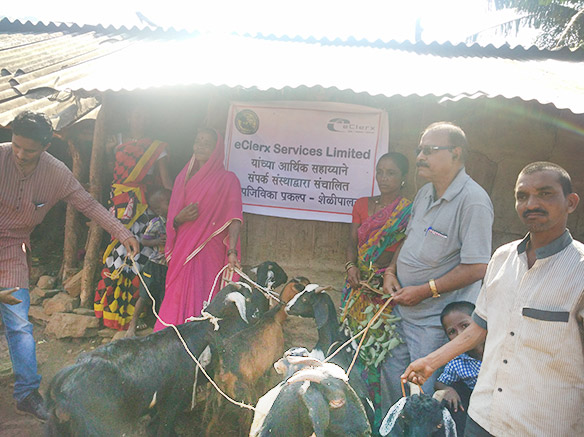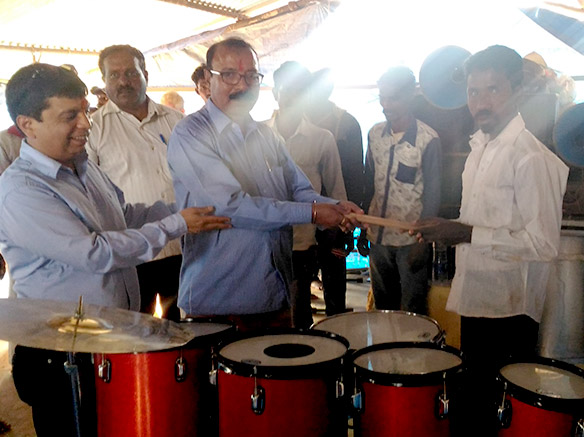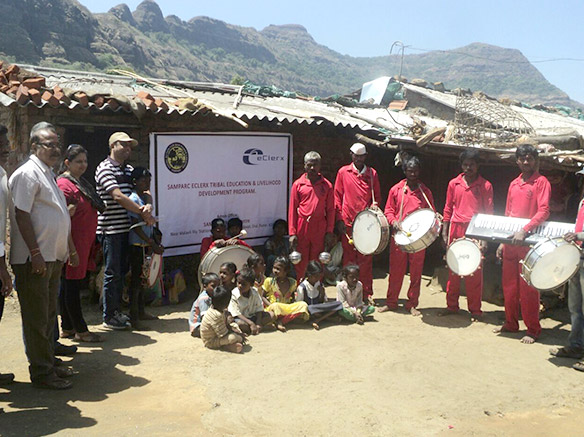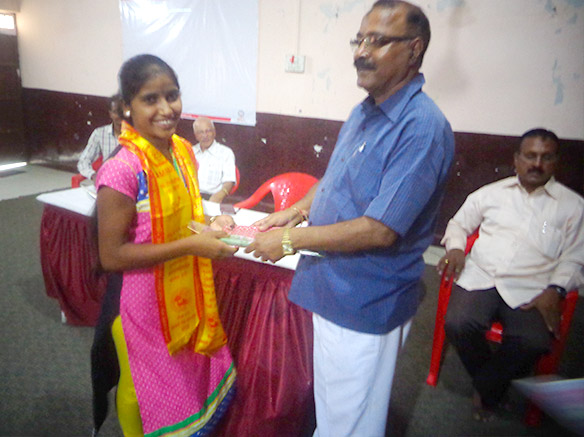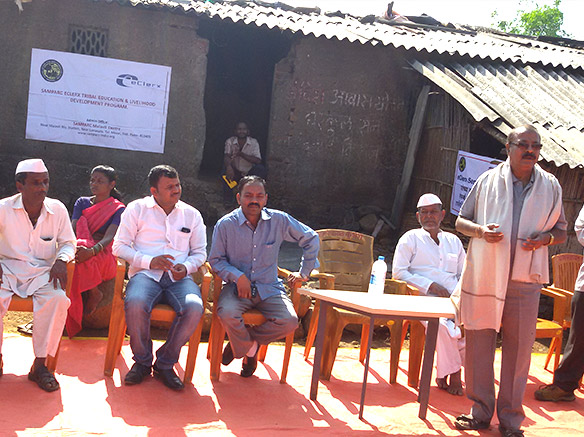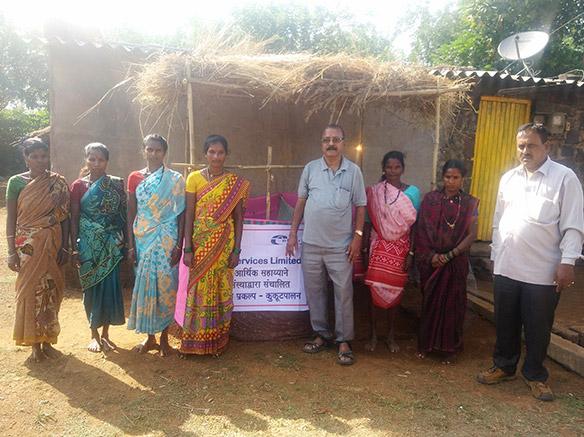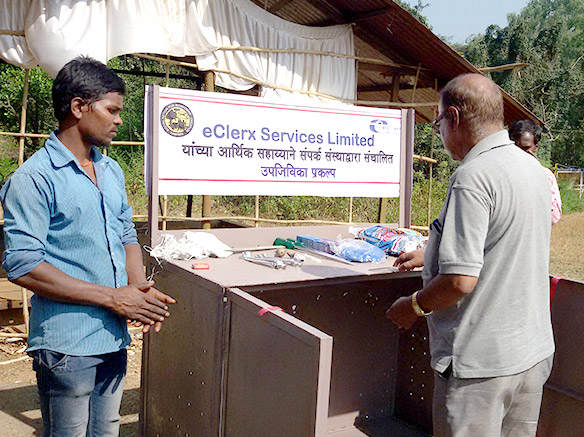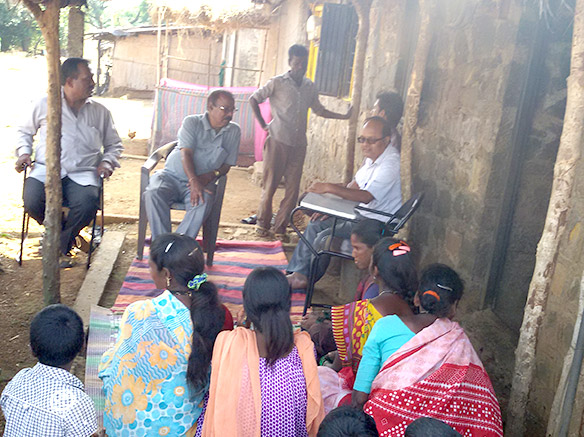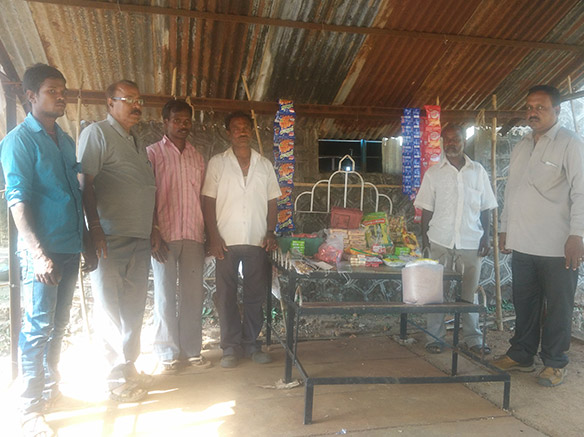SAMPARC TRIBAL DEVELOPMENT
SAMPARC TRIBAL DEVELOPMENT
Tal. Mulshi, Dist. Pune, Maharashtra
Project Incharge: Mr. Anuj Singh Mob: +91 9766343456
SAMPARC initiated the Tribal Development Project with the vision to uplift the socio-economic and educational conditions of the marginalized Katkari tribal community in Mulshi Taluka. The project began with an innovative approach of introducing informal education through music, dance, and cultural activities to draw children towards learning, while simultaneously working to improve the quality of life of tribal families through livelihood interventions.
The core objective of the project is to enrol Katkari children in SAMPARC’s educational institutions and nearby Zilla Parishad Schools, supported by continuous counselling and awareness programs for parents to promote the importance of education. Alongside, the project actively works with Katkari families in 113 villages of the Mulshi Block to enhance their standard of living through income-generating activities and structured programs aimed at reducing alcohol addiction and improving health awareness.
Since its inception in 2014, the project has created a measurable impact on education. A total till year of 6,461 tribal children have been enrolled in 98 Zilla Parishad schools and SAMPARC hostel-based schools, achieving 100% of the projected target. Intensive community outreach through home visits, counselling, and school follow-ups has resulted in zero dropouts among enrolled students. To support academic performance, students receive educational counselling and are provided with necessary learning materials. The students have shown significant growth in motivation and academic ambition, stepping out of traditional norms to pursue a future grounded in education.
A noteworthy impact of the initiative is seen in the residential support provided at the SAMPARC School & Hostel in Bhambarde. Since 2014, 1490 tribal children have been accommodated here, receiving holistic care through nutritious food, health support, and a nurturing home-like atmosphere. Students benefit from academic tutoring, sports, computer education, and cultural activities, enabling them to develop into confident and capable young individuals.
The project also addresses the socio-economic challenges of tribal families through an extensive livelihood support program. SAMPARC empowers families to become self-reliant by helping them initiate income-generating ventures aligned with their interests. The program includes assistance in obtaining essential documentation such as Aadhaar cards, ration cards, voter IDs, caste certificates, and bank accounts, ensuring eligibility for various government schemes.
Currently, 912 families are being supported through livelihood activities that include fishing, goat rearing, banjo playing, welding, tailoring, small businesses, and more. These activities have resulted in an average income increase of 25% to 35% per annum, substantially improving family stability and reducing seasonal migration by up to 94%. The stabilization of families at the village level has also directly contributed to a decrease in school dropout rates.
Additionally, the project supports alcohol de-addiction awareness and health & hygiene education to promote holistic well-being in tribal communities. SAMPARC has facilitated access to government welfare schemes for 4,800 individuals, resulting in subsidies and benefits amounting to Rs. 94 lakhs over the past decade. The support has been instrumental in transforming the lives of Katkari families from dependency to self-sufficiency.
SAMPARC’s Tribal Development Project is a model of integrated rural development, where education, livelihood, health, and documentation converge to bring lasting change. Through dedicated efforts, SAMPARC continues to build a generation of tribal youth who aspire to be educated, empowered, and engaged in shaping a dignified future.
Case Study ---
STORY OF CHANGE:
It was the first year of the project intervention, when SAMAPRC social worker met with Mr. BabanBaluPawar at Kumbheri village of Mulshi Taluka, Pune District. During the interaction with him, our social workers tried to know about the level of poverty, needs and other issues to improve the present situation. They also discussed about the type of livelihood support he required for the survival of his family. They were working as daily waged labor and used to migrate to find job. As this family did not have any land & any other means of livelihood, he requested us for the support of fishing net so that he can catch fish from Mulshi Dam and can sell it in the village & nearby Markets in Maale & Lonavala.
As per his requirement, SAMPARC supported him to procure the fishing net. After receiving the net, he started to catch the fish from the dam and started to earn at least Rs.240-300 per day as an additional income to his family. During the last three years, he is in the same business and earning good amount for survival of his family. Because of this additional income, he could return his debts to the Sahukaar, and rest of the money he invested in buying a pair of Goat, which will create additional income without additional investment. Now, his family is very much happy and appreciating efforts of eClerx- SAMPARC for the support extended through livelihood support.
Output
Through sustained efforts under the Education Support initiative, all 1,350 tribal children across the project area are continuing their education without a single dropout—ensuring consistent learning and academic progress. At the same time, Livelihood Support has empowered 912 Katkari families, resulting in significant improvements in their economic status and overall living conditions. The income generated through these initiatives is being effectively utilized to meet essential household needs. Furthermore, over 8,000 tribal individuals have been successfully linked to government welfare schemes and have received vital documents such as PAN cards, bank passbooks, ration cards, caste certificates, voter ID cards, and Aadhaar cards—enabling them to access their rightful entitlements and public services.
IMPACT
Tribal Katkari children, who once had no access to education, are now attending school regularly with a renewed sense of purpose and hope for the future. Their parents, once unaware of the value of education, are now proud to see their children learning and developing a clear vision for their lives. Livelihood support has significantly reduced the need for families to migrate in search of work and has also contributed to a noticeable decline in alcohol consumption. One of the most transformative outcomes has been the successful facilitation of documentation and linkages with government schemes. Over 8,000 tribal individuals now possess essential identity documents such as PAN cards, Aadhaar cards, caste certificates, ration cards, and bank passbooks. These documents have not only given them a sense of identity and belonging but have also enabled them to access welfare schemes, financial services, and entitlements that were previously out of reach. With regular income and stronger institutional support, Katkari families are now leading more secure, dignified, and self-reliant lives.
ACHIEVEMENTS
Through SAMPARC’s proactive efforts, hundreds of previously deprived Katkari tribal families have now secured their rightful identity and access to essential government services. With official caste certificates issued by the Tribal Department and Tehsil Office, and vital documents like Aadhaar cards, Jan Dhan bank accounts, voter IDs, and ration cards in place, these families are no longer invisible to the system. This foundational step has empowered them to access various government welfare schemes, financial inclusion programs, and social security benefits—marking a major milestone in their journey toward dignity and inclusion.
MORE ABOUT SAMPARC TRIBAL DEVELOPMENT
Since 2014-15, SAMPARC has been at the forefront of transforming the lives of 912 Katkari tribal families across 113 remote villages in the Mulshi, Maval, Bhor, and Velha Talukas of Pune District. With steadfast support from eClerx Services Limited, this initiative goes beyond charity—it builds sustainable livelihoods, restores dignity, and empowers tribal communities to become self-reliant.
Through a diverse range of income-generating activities—such as goat rearing, backyard poultry, fishing net weaving, bamboo and carpentry craft, tent and pandal services, banjo and sound system setups, mini shops, tailoring, and welding—families are now earning an additional 25% to 35% income annually, bringing economic stability and hope to some of the most underserved communities.
Families who once migrated seasonally in search of work are now settled, with over 90% reduction in migration. Livestock and microenterprises have become capital assets, laying the foundation for long-term financial independence. Beneficiaries also receive training in basic business practices and financial literacy to strengthen their entrepreneurial capacity.
Beyond income, the program focuses on holistic development. Community awareness through street plays has led to a visible decline in alcohol addiction. Regular health check-ups and awareness drives by SAMPARC's medical team have inspired better hygiene, sanitation, and preventive healthcare practices among tribal families. Today, these hamlets are cleaner, children are healthier, and families are more confident in shaping their own futures.
A critical pillar of the initiative is government linkage and documentation support. SAMPARC has helped thousands of tribal individuals secure vital identity documents including Aadhaar cards, ration cards, voter IDs, caste certificates, and bank accounts—opening doors to government welfare schemes and social security benefits they were long denied.
Most importantly, with families stabilized in their villages, there has been a significant reduction in school dropouts. Katkari children—many of whom had never stepped into a classroom—are now attending school regularly, with parents embracing education as a pathway to a brighter future.
This is not just development—it is transformation. SAMPARC’s Tribal Development Program is a testimony to what focused, compassionate, and inclusive action can achieve for India’s most marginalized communities.

